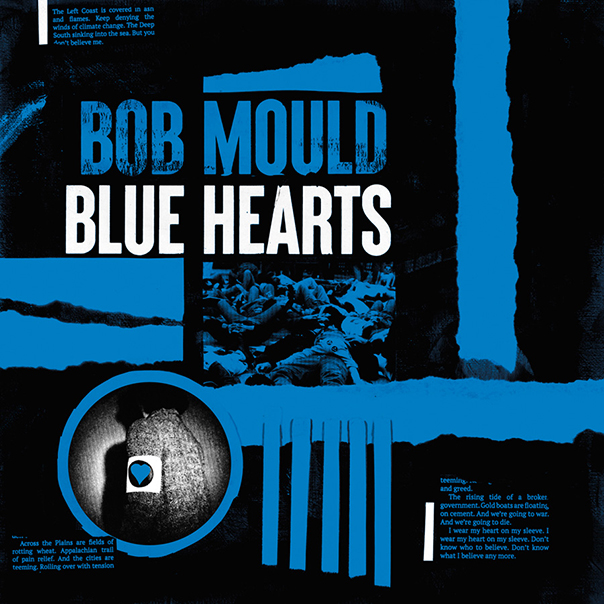ALBUM REVIEW: Bob Mould’s ‘Blue Hearts’ a worthwhile punk ride for 2020

In this shitbag year of 2020 A.D. (Absolute Deception? Assembly of Dicks? All Duck?), a punk rocker with a brain fine-tuned to sweet melody, about to turn 60 all while still raking musical muck—is literally beautiful music to the ears. Not that anyone should expect anything else from Bob Mould. Artists are supposed to channel perceptions and memories into their art, but he does it in a way that grabs hold and makes one listen.
Blue Hearts
Bob Mould
Merge, Oct. 2
8/10
Mould’s new album, Blue Hearts, (which comes a little over a year since 2019’s Sunshine Rock) isn’t going to the bellwether of the times. It’s not going to be what most people think of when revisiting the cultural shoving match that’s only going to escalate into God knows what before 2021. Perhaps it’s the soundtrack to a thoughtful, indie documentary? Maybe. It’s good enough, passionate enough and perhaps necessary enough.
Thoughtful fervor delivered with volume has been Mould’s speciality since the days of Hüsker Dü, rhe wonderfully influential trio from Minneapolis that Bob Mould led as a closeted gay man while a popular president pandered to the religious right and turned a blind eye to the explosion of AIDS. The methodology of Blue Hearts isn’t new ground for Mould, nor is Neil Young rushing out a half-baked single after 9/11. Mould sounds like he took a deep breath, considered his feelings, then let it loose with a barrage of familiar guitar rock—still hovering near the pinnacle of what was once called alt-rock.
Album opener “Heart On My Sleeve” is a chunky, acoustic mid-tempo preview of what’s to come—morphing into the frantic “Next Generation.” That song wastes no time musically or lyrically in getting to the point that something needs to be done. It sounds like it could be the best song on the record, until it ends abruptly and launches into “American Crisis,” (which you’ll discover, perhaps gleefully, rhymes with “evangelical ISIS”).
“American Crisis” is another barnburner that just lays out Mould’s disgust: “I never thought I’d see this bullshit again/ To come of age in the ’80s was bad enough/ We were marginalized and demonized/ I watched a lot of my generation die/ Welcome back to American crisis/ No telling what the price is.”
By the time “Fireball” gets rolling, Blue Hearts sounds encouragingly like an all-out punk rock assault. Things slow a bit during single “Forecast of Rain,” which shows Bob Mould off as a seriously professional songwriter. He crafts fresh intellectualism into a great vocal line without sounding like the sonic equivalent of someone ramming a square peg into a round hole.
“When You left” is another well-crafted song, efficient in structure and well-placed power guitar—alongside Mould’s occasional shouting. “Siberian Butterfly” has the same urgent quality. By “Racing to the End,” it’s obvious that you’re in the middle of—while maybe not a punk rock classic—a record that displays Mould as a punk rock paragon, knowing how to properly match music and sentiment (which is different than sentimentality, which isn’t very punk).
By the time Mould gets to “Little Pieces,” “Leather Dreams” and “Password to My Soul,” he’s cruising through a record that won’t make fans even think about skipping songs. “The Ocean,” ends the record like someone stretching at the end of a run. Here’s hoping the alt-rock legend doesn’t need the same fuel next time he needs to burn inspiration.
Follow music critic Tony Hicks at Twitter.com/TonyBaloney1967.
